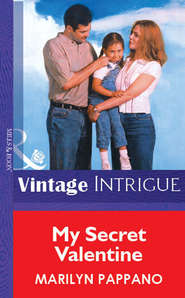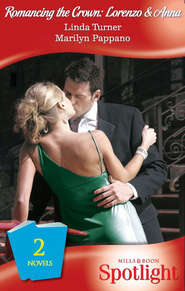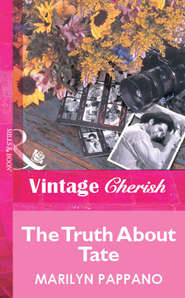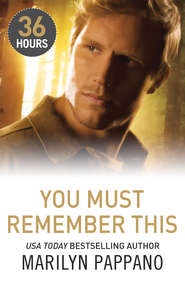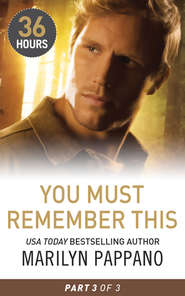По всем вопросам обращайтесь на: info@litportal.ru
(©) 2003-2025.
✖
Somebody's Hero
Автор
Год написания книги
2018
Настройки чтения
Размер шрифта
Высота строк
Поля
That same money wouldn’t carry her through the end of the year in Chicago.
Just that thought gave the town a little brighter gleam.
They ordered hamburgers, and Jayne was all but drooling over the crispy thick-cut fries that came with them when the bell over the door dinged with a new arrival. She looked up to see another young woman, in her early to midtwenties, wearing jeans, a turtleneck under a heavy flannel shirt and boots with thick ridged soles. Despite the lumberjack clothes, there was something amazingly feminine about her, and it had nothing to do with the stylish blond hair or the three pairs of hoops that graced her earlobes.
Sorting through the stack of mail she carried, she called, “I’m back, Carla.”
The waitress appeared in the pass-through window. “How’s your mom?”
“She’s fine.”
“How’s Tyler?”
“Not answering his phone, as usual.”
One of Jayne’s heroines might jump to the conclusion that this lovely woman and Tyler were involved. Truth was, Jayne didn’t care beyond the fact that it would answer her question whether Tyler was antisocial with everyone or just her. Curiosity—that was all it was.
“His new neighbor’s here,” the waitress said with a gesture, and the woman turned to give them a speculative look. After a moment, she started their way.
Jayne dropped her gaze back to her burger. Her sweatshirt was dusty and cobwebby, and she hadn’t bothered with makeup this morning, not when she was still wearing the remnants of yesterday’s application. The last thing she needed was to meet someone who would make her feel dowdy even all dressed up—especially someone who might or might not be romantically involved with her neighbor.
But the woman didn’t detour away. She didn’t stumble and fall flat on her face or disappear into thin air but glided to a stop at the end of their table. “You must be Jayne.”
Jayne smiled politely. “Yes, I am. This is my daughter, Lucy.”
“Hi, Lucy. I’m Rebecca Lewis. I understand you’ve met my brother Tyler.”
That made Jayne feel marginally better. Sisters were less intimidating than girlfriends—no matter that she had zero interest in the man in question.
“What do you think of Sweetwater?”
Jayne glanced out the window, then back at Rebecca. “It’s…different.”
Rebecca showed no offense. “It’s small but boring, which is not always a bad thing. We grew up in Nashville—at least, until Tyler was fourteen and I was nine, when we came here to live with my grandparents. I liked the change.” She pulled a chair from the nearest table and sat down. “I take it you’re…” With a glance at Lucy, she hesitated. “Do you use the D word?”
Lucy seemed preoccupied with driving the ketchup bottle around the table with one hand while eating fries with the other, but she was never really tuned out. She often repeated something overheard during her most oblivious act. For that reason, Jayne had been as honest with her as a five-year-old deserved.
“Yeah. Lucy’s dad and I are divorced.”
“Too bad,” Rebecca said, then shrugged. “Or maybe not. I’ve got a few ex-boyfriends that I was more than happy to see the last of. The rumor mill says you’re a writer.”
“Historical romances.” Jayne was never sure what response that news would bring. There were the inevitable snickers and insults about trashy sex books and bodice rippers—not that one of her characters had ripped a bodice ever in his life—along with polite disinterest. Some people wondered why she didn’t write real books, and some, bless their hearts, were fans of the genre who were tickled to meet a real-life author.
“Really. That’s cool. How many books have you sold?”
“Eight.” Four in the eighteen months before she’d married Greg, and only four more in the following six years. There was a depressing statistic.
“Do you write under your own name?”
“No, I write as…Rochelle Starr.” Jayne hated admitting to her pseudonym. It was so overblown, so fake.
But Rebecca didn’t even blink. Instead she teasingly asked, “So, after selling eight romance novels, do you have any special insight into men?”
She laughed. “Yeah. They’re alien life-forms.”
“Isn’t that truth? So you already know everything you need to get along just fine with my brother.”
Jayne didn’t want to get along with Tyler, other than in a neighborly fashion—and she meant big-city neighborly, where you smiled and waved when you passed, helped each other out in an emergency but otherwise lived separate lives. She wasn’t looking for a man to share her life. She wrote fantasy love stories, and fantasy was one thing she already knew a lot about. She didn’t need living, breathing inspiration.
“Speaking of Tyler, could you save me a trip and give him something for me when you go home?” Rebecca asked.
Jayne’s smile was fixed in place as she gave the only answer she could. “Sure.”
“I’ll get it now.” Rebecca left her seat and disappeared through the swinging door into the kitchen.
By the time she returned, Jayne and Lucy were finished with their meals and Jayne had pulled out a twenty to pay the check Carla had delivered. Rebecca brushed it away. “It’s on the house. Consider it our welcome to Sweetwater.”
“Thank you.”
Rebecca set a large brown bag on the table. The top was folded over, and an envelope with Tyler’s name on it was binder-clipped to the fold. A chill emanated from it, suggesting its contents were frozen. Food? Did Rebecca make it her duty to make sure her big brother had a good meal from time to time?
“Thanks for delivering this and, like I said, welcome to Sweetwater. I hope I see a lot of you.”
“I’m sure you will,” Jayne said as she left a tip for the waitress, then helped Lucy into her coat.
After all, the diner’s only competition in town was a hot dog at the gas station.
Country music played on the stereo, nothing but a distant hum until Tyler shut off the sander. While running his hand over the surface, he hummed a few bars, but humming was as far as it went. The last time he had sung a song, his mother had remarked that he sounded just like his father, then burst into tears. That had been the end of singing for him.
This piece was the final door to the entertainment armoire he’d been working on for the past few weeks. It was his own design, built of walnut and carved with a rising-sun pattern on the upper two doors. It had turned out better than he’d expected—good enough to offer to the same pricey shops that sold Daniel’s work. But it was going into his living room, where few people besides him would ever see it.
He’d begun working with Daniel when he was fifteen. Life had been tough then—his mother away, adjusting to Sweetwater after Nashville, trying to fit in when kids talked about his family both behind his back and to his face. All the adults had agreed that he needed something constructive to occupy his time. Since Zachary couldn’t train him in the legal trade, his good friend Daniel had offered to teach him carpentry. They’d meant to keep him busy and out of fights, but instead he’d found a career.
He might never get rich at it, but his house was paid for, he had money in the bank, and he liked going to work every day. That counted for a lot.
A shadow fell across the open door, catching his attention an instant before Lucy Miller stepped into sight. She was carrying a grocery bag, clutching it to her body with both arms, and her eyes were wide as she looked all around. Disappointment curved the corners of her mouth. “You can’t even tell it’s s’posed to be a barn. Where’s the hay? Where do the horses go? Where do the cows go?”
His muscles tightened as he picked up a tack cloth and began wiping down the door, removing the bits of dust that inevitably escaped the sander’s vacuum bag. He didn’t like interruptions, especially from a talkative neighbor whose mother was pretty and needful. “Where’s your—”
Before he could finish, Jayne appeared behind her daughter, her cheeks flushed. “Lucy, I told you—wow.” Stepping around Lucy, she came farther into the room, to the table where the finished door was lying. She reached out, almost touched the carving, then drew back. “Did you do this?”
“Yeah.”
“Wow,” she murmured again, then turned to look around. He didn’t have to look to know what she saw—neatness that bordered on compulsion. A place for everything and everything in its place. He’d learned at an early age that there was hell to pay for disorder—and usually someone else paid it. Now that he lived alone, there was no one to care whether he put something in the wrong place, but it was a hard habit to break.
Jayne walked around the room. A stranger in his workshop was even more disruptive than in his house. He wanted her to leave—even if some small part of him appreciated the way she trailed her hand along the counter. The way she sniffed the fresh lumber stacked against one wall. The pleasure she took in studying the few finished pieces.
“This is gorgeous,” she said, ending up back at the armoire door. “Are you going to sell it?”






